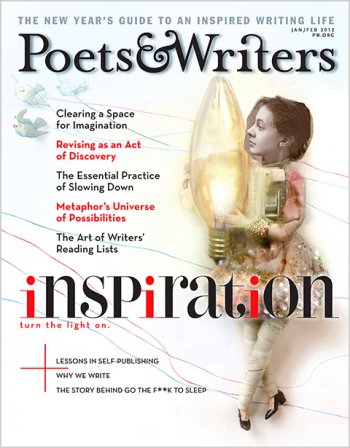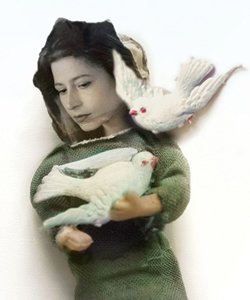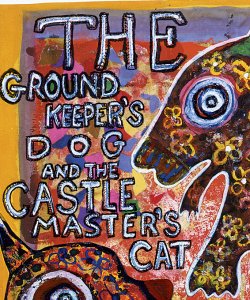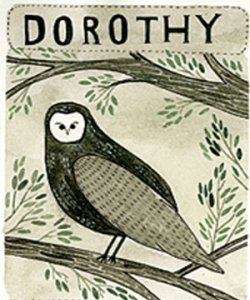
The New Year’s guide to an inspired writing life, featuring a special section on inspiration, plus our seventh annual debut poets roundup; lessons in self-publishing salesmanship; why we write; the story behind Go the F**k to Sleep; and more.
Jump to navigation Skip to content

The New Year’s guide to an inspired writing life, featuring a special section on inspiration, plus our seventh annual debut poets roundup; lessons in self-publishing salesmanship; why we write; the story behind Go the F**k to Sleep; and more.
For the serious reader, many of the “best of” literary lists churned out on the web warrant no more than a curious glance. But, as Joshua Bodwell discovers, following personal recommendations and tailoring a reading lists of one’s own can nourish...
A childhood interest in calligraphy taught journalist Arnie Cooper that the physical act of writing—letter by letter—can bring a writer into the moment and make the words flow.
An author and creative writing teacher dissects a poem and discovers that the most fecund metaphors are made when the writer surrenders herself to imagination over intellect.
Years passed before fiction writer Jeremiah Chamberlin was able to heed the advice of Charles D’Ambrosio to revise a story the author thought was perfect—and to discover that the revision process can uncover latent truths.
Twelve poets who published first collections in 2011 discuss the unique landscapes of their imaginative worlds, revealing influences and sources of inspiration.

What creativity needs most of all is time for the mind to percolate, to mix old ideas together in new ways, and to find connections no one else has found. For this the mind must be left to itself.

For nearly a century, the ampersand has been a key feature of certain strands of American poetry. To understand its history in the genre—and the role it plays for contemporary poets—one must return to the character’s origins.
After making a name for itself in independent-press circles with its stylish, smart books of fiction, children’s literature, and food writing, the fourteen-year-old San Francisco–based outfit McSweeney’s is starting its first poetry imprint.
With so many good books being published every month, some literary titles worth exploring can get lost in the stacks. Page One offers the first lines of a dozen recently released books, including Ben Marcus’s The Flame Alphabet and Amy Newman’s Dear Editor, as the starting point for a closer look at these new and noteworthy titles.
In this regular feature, we offer a few suggestions for podcasts, apps, web tools, newsletters, museum shows, and gallery openings: a medley of literary curiosities for readers and writers on a budget.
Literary MagNet chronicles the start-ups and closures, successes and failures, anniversaries and accolades, changes of editorship and special issues—in short, the news and trends—of literary magazines. This issue’s MagNet features New World Writing, Transition, Asymptote, the White Review, Granta, the Dark Horse, and Versal.
The newly launched Findings, an online community that lets users compile and contribute excerpts from books and websites, joins a growing number of digital endeavors that place a new emphasis on sharing while reading.

Polly Becker, a Boston-based artist who in her formative years was influenced stylistically by artists such as Edward Gorey, Alphonse Mucha, and Aubrey Beardsley, speaks about the assemblages she created for the cover and our special section on inspiration.

In this issue we offer a look at one of Kenneth Patchen’s “picture-poems,” currently on display in An Astonished Eye: The Art of Kenneth Patchen, the largest-ever exhibition of the genre-defying writer’s visual work, at the University of Rochester in New York.

Small Press Points highlights the innovative and can-do spirit of independent presses. This issue features Dorothy, a publishing project, which aims to publish books “of slightly different aesthetic sensibilities but equal wonderfulness” written by women.
Broome Street Review editor Andrew E. Colarusso is looking for work that reveals its genius in “brief, bright flashes” paired with a lasting emotional resonance.
An irreverent children’ book, a quiet but resonant debut, and a novel that had legs before it even left the gate rewrite the fortunes of the small presses that published them.

Geoffrey Bartholomew, poet and head bartender at McSorley’s Old Ale House, New York City’s famous saloon, reveals how he sold five thousand copies of his self-published poetry collection while pushing pints from behind the bar.
Following the death of her husband, one woman begins writing to outpace the pain of grief and discovers in her own words the evolution of mourning.
The writer’s duty of accurately naming the world takes on new importance for a new father, whose infant son teaches him that it’s sometimes more pleasurable to flirt with meaning than to be precise.
David Rowell, an editor at the Washington Post Magazine and a former editor at DoubleTake, the now-shuttered magazine of photography and reportage, finds inspiration for a novel in a series of photographs documenting the 1968...
The Grub Street literary center has created a long-form fiction class that might offer a cure for the novel-writing anxiety that the traditionally story-centric MFA workshop isn’t equipped to resolve.